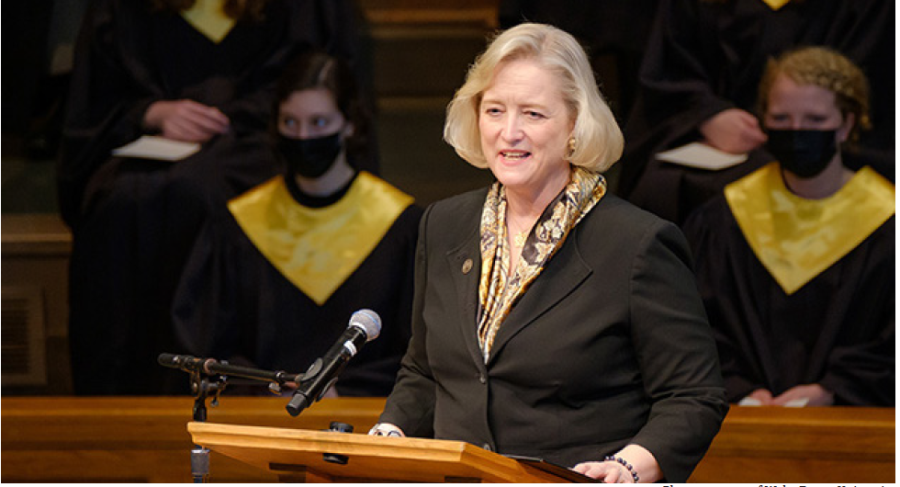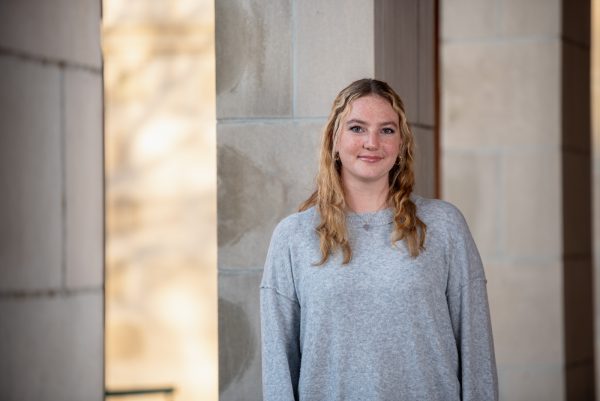WFU hosts annual Founders’ Day Convocation
The event celebrated the university’s successes while also acknowledging its past failures
Wake Forest held its annual Founders’ Day Convocation in Wait Chapel on Feb. 17. President Wente delivered the opening address and reflected on her first year at Wake Forest.
February 24, 2022
On Thursday, Feb. 17, Wake Forest University held its annual Founders’ Day Convocation. The ceremony, which took place in Wait Chapel, celebrated the university’s legacy, commemorating the strides Wake Forest has made in the academic sphere and beyond, while also acknowledging the aspects of its history that do not serve as points of pride.
The event featured a variety of speakers, including members of the Wake Forest faculty and senior Bea Pearson. Susan Wente delivered the opening address and reflected on her first year at Wake Forest. She emphasized the importance of “acknowledging where we have fallen short” in an effort to “empower ourselves to strive forward.” Additionally, she posed the question that guided the remainder of the ceremony: “What does it mean to be a founder?”
Wente’s introduction was followed by a reflective speech from Dr. Erica Still, Associate Professor of English and Associate Dean for Faculty Recruitment, Diversity and Inclusion. Still began by discussing Maya Angelou’s impact on the university and her thoughts regarding Angelou becoming the first African American woman on U.S currency. As Still described, she experienced mixed emotions regarding this gesture and called attention to the irony of a Black woman existing on a currency that was used to buy and sell African Americans to enslavers. However, Still concluded with the symbolic nature of the quarter itself and noted the presence of a Black woman on a coin that people collect signifies the importance of Angelou’s life and actions.
The next portion of the ceremony included a pause and reflection for the members of the Wake Forest community lost since the last Founders’ Day Convocation. To honor these individuals, the Wake Forest Choir performed while a video montage of campus was shown to the attendees. The names and graduation years of each person lost were displayed across the screen. The presentation paid special homage to Cheslie Kryst, a Wake Forest School of Law and Wake Forest School of Business graduate who committed suicide this past January.
Following this tribute was an address from Dr. Anthony Marsh, a dean of the College. Marsh underscored the 187-year-old history of student orations at Wake Forest and detailed “the art of the spoken word”. This tradition, as Marsh stated, rests on a core tenet of the liberal arts education — communication skills.
The senior orator for this year’s ceremony was Bea Pearson. Following the pattern of the other speakers, Pearson highlighted both the prideful and shameful chapters of Wake Forest’s history. Pearson went on to describe her experience as a Black woman at the university, expressing how at times she “remained uncomfortable” among her peers. Yet Pearson continued with her appreciation for her continued growth at Wake Forest, demonstrating how she has learned that “being uprooted allows you to flourish”.
Another Convocation tradition, awarding of the Medallion of Merit, took place after the senior oration. The recipient, former Wake Forest President Dr. Nathan O. Hatch, was honored with remarks from colleagues and a video montage that was shown to the audience. Hatch was commended for his dedication to the university and his commitment to the university’s motto “Pro Humanitate”.
The ceremony concluded with remarks from Dr. Jonathan Lee Walton, dean of the School of Divinity. Walton reflected on Wente’s opening question and expressed that every individual on this campus plays a defining role in creating a welcoming environment that strives for excellence.
“These names — your name — can establish the direction of our future,” Walton said. “Let’s use our names each and every day.”























